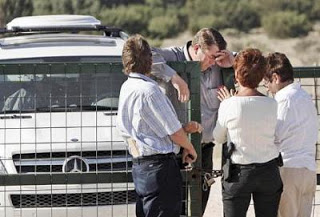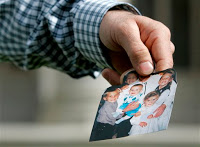Friday, May 23, 2008
An Ambiguous Victory (Updated)

Yes, the Constitution applies even to them: FLDS member Willie Jessop turns away a CPS commissarina who demanded access to the YFZ Ranch to conduct a warrantless search. Mr. Jessop told the finger-wagging shrike to get the constitutionally mandated paperwork together, and he’d let her in. It was shortly before noon on Wednesday, May 20, when two Texas CPS officials, in the company of armed Sheriff’s Deputies, arrived at the gates of the largely deserted YFZ Ranch. Nearly everybody involved in the custody fight over some 463 people (both children and young emancipated adults dishonestly depicted as minors by the CPS) was either in court, on the way to court, or somewhere in the vast Texas state highway system trying to visit their abducted kids.
So apparently the CPS decided to exploit this opportunity to snoop around the FLDS property. The purported reason for this raid was a hot tip from a conveniently anonymous informant — hey, we know that leads of that kind are always reliable, right? — that five children, including one with Down’s Syndrome, had arrived at the ranch sometime after the other children had been taken into government custody.
Last time, the CPS prevailed on Merrill Jessop, the Bishop (or Overseer) of the FLDS community, to order his followers to let the Child Snatchers in, despite the fact that their search warrant was entirely invalid.
Trained from infancy to comply immediately and without qualification to an order from their “priesthood head,” the FLDS cooperated — and as a result hundreds of children were abducted by the state at gunpoint on the basis of non-existent “evidence” of widespread abuse.
On Wednesday morning, however, FLDS officials were not as complaisant.
“If they have an honest complaint, we’ll be honest, but we were lied to,” protested Willie Jessop to the handful of reporters who had scrambled out to the ranch.Asked later in the day about the abortive raid, CPS spokesliar Marleigh Meisner insisted (in the words of a Salt Lake Tribune paraphrase) that the agency, which “
does not conduct criminal investigations, never uses search warrants. “Those blessed with memories longer than the life-span of the typical Mayfly will recall that the CPS did get a search warrant before the initial April 3 raid. Yes, I know that the CPS arrogantly claims that its investigators aren’t impeded by familiar Due Process requirements. But it’s odd, nonetheless, that the agency took the time to get a warrant (albeit a spurious one) for the first raid, but conducted the most recent one with such indecent haste that it didn’t even bother with the pretense of filing the proper paperwork.
Another oddity: The 5-year-old with Down Syndrome for whom the CPS was searching on May 20 had already been abducted and was in the custody of the agency. While the CPS, even at what passes for its best, is hardly a model of competence, the haste and sloppiness of this most recent attempted raid suggests that, in addition to the agency’s familiar malice, something akin to panic might have been at work.

I suspect — but cannot yet prove — that the attempted raid on May 20 had a great deal to do with the appellate decision (.pdf) handed down the following day (yesterday, May 21) excoriating the agency for abusing its “discretion” in conducting a mass child seizure without so much as a particle of evidence that abuse was underway or an imminent threat.
The CPS surely knew the weakness of its case against the FLDS, and could probably predict how the Third District Court of Appeals would rule. I suspect that they needed to find something to supplement its anemic brief, thereby buttressing the illusion that an investigation into actual abuse was underway and that the appeals court should let them have sufficient time to build a case.
The Court of Appeals decision is significant primarily for the tone of composed indignation with which it demolishes the CPS’s claim to have conducted a “child protection” operation, as opposed to a straight-up mass child abduction under the color of State power.
On pages five and six of that document, the court makes four separate uses of the expression “no evidence” in dismissing the abuse claims made by CPS (the emphasis in each use is mine):
*”There was no evidence that the male children, or the female children who had no reached puberty, were victims of sexual or other physical abuse or in danger of being victims of sexual or other physical abuse”;
*”… there was no evidence regarding the marital status of [twenty pregnant females identified by CPS as being from 13-20 years of age] when they became pregnant or the circumstances under which they became pregnant other than the general allegation that the girls were living in an FLDS community with a belief system that condoned underage marriage and sex”;
*”There was no evidence that any of the female children other than the five identified as having become pregnant between the ages of fifteen and seventeen were victims or potential victims of sexual or other physical abuse”;
*Except for that same group of five expectant mothers, “there was no evidence of any physical abuse or harm to any other child[.]”
The Court’s ruling came in response to a petition for a Writ of Mandamus filed on behalf of thirty-eight women (referred to as “Realtors”) whose children were seized by CPS. In conducting the seizure, CPS “failed to establish that the need for protection of the Realtors’ children was urgent and required immediate removal of the children…. [N]one of the identified minors who are or have been pregnant are children of Realtors. There is no evidence” — that phrase again — “that any of the five pregnant minors live in the same household as the Realtors’ children.”
The decision likewise eviscerates the CPS’s novel collectivist theory that the entire community should be treated as one “household” for the purpose of a child “protection” action. Under that approach, a single alleged incident of abuse would effectively incriminate every adult in the community and justify the “protective” seizure of all the resident children.
In words savoring of chilled contempt, the Court vivisected that theory and discarded the bleeding remains:
“The notion that the entire ranch community constitutes a `household’ as contemplated by section 262.201 [of the Texas Code, which deals with child protection actions] and justifies removing all children from the ranch community if there even is one incident of suspected child sexual abuse is” — here we go again! — “contrary to the evidence. The Department’s witnesses acknowledged that the ranch community was divided into separate family groups and separate households. While there was evidence that the living arrangements on the ranch are more communal than most typical neighborhoods, the evidence was not legally or factually sufficient to support a theory that the entire ranch community was a `household.’…”
Even if were proper to treat the FLDS retreat as a single undifferentiated household, the CPS is still left with that nagging, persistent lack of evidence that actual abuse of any kind was underway.
To make the case that the children at YFZ Ranch confronted a dire threat of abuse, the CPS had to go to the First Bank of Cosmic Supposition and borrow heavily on the assumption that at some unspecified future date the children may be abused. The “evidence” presented as collateral for this loan, notes the court, was that the children “live in a community where there is a `pervasive belief system’ that condones marriage and child-rearing as soon as females reach puberty.”
Once that belief is wedded (if you’ll pardon the expression) to an actual, provable incident of sexual misconduct, it is proper to arrest the accused offender and put him on trial. Our system of laws — as I remember reading about that system; it was dead long before my time — was designed to deal out justice in individualized portions once due process had provided proof beyond a reasonable doubt.
The CPS has displayed disdain for that bourgeois approach: Why deal out individual justice for crimes that have been committed, when we can accuse the entire community of participation in crimes yet to be conceived, and then blackmail the adults into accepting their guilt by stealing their children?
To its considerable credit, the Third District Court of Appeals refused to ratify this Vladimir Lenin-by-way-of-Hillary Clinton approach to collective punishment in the name of “the children.” And once again, the court was able to cite key factual concessions by the CPS to demonstrate how its innovative legal theory was unsustainable:
“The simple fact [writes the court in footnote 11 of the decision], conceded by the Department, that not all FLDS families are polygamous or allow their female children to marry as minors demonstrates the danger of removing children from their homes based on the broad-brush ascription of every aspect of a belief system to every person living among followers of the belief system or professing to follow the belief system.”
Digested to its essence, the decision reads as follows:
If you’re going accuse someone of child abuse, you have to follow the rules of Due Process. This means, among other things, citing tangible, plausible evidence of actual offenses, rather than presenting to the court the reeking discharge from your collective emunctory aperture and describing it as a novel theory of collective punishment.
This seems like a very simple and obvious proposition. But as Chesterton once said, sometimes it takes a certain kind of courage to stand up in public and say that two times two equals four.
Unfortunately, after demolishing the CPS’s legal claims down to the sub-atomic level, the Court did not issue the desired Writ of Mandamus — an order to the department to return the children immediately. This gave the CPS the option of keeping the children in its custody while appealing the decision — a course of action the agency has, quite predictably, followed.
 A new reason to hope — but their children aren’t free, yet.
A new reason to hope — but their children aren’t free, yet.Some observers believe the FLDS court victory presages an eventual — and perhaps immediate — restoration of the children to their families. I wish I could share that optimistic assessment.
As an appendage of the Texas government, the CPS has the resources to drag out this legal battle for as long as necessary — until every child taken from YFZ Ranch reaches adulthood, should it come to that. Perhaps the only thing that could prevent this from happening would be a court order to CPS — backed with a threat to hold in contempt, and arrest, non-cooperating agency officials — that the children must be returned while the legal dispute continues.
But as I’ve pointed out, the CPS isn’t interested in the law, only in the physical possession of the children. As long as the children remain in that agency’s hands — as long as the CPS in any state has the power to seize children in the first place — the law simply doesn’t matter.
Chipping away at the stonewall….
This is pretty compelling evidence that CPS knows its position is completely untenable, but they’ll continue to drag out this matter as long as they can:
“State child welfare authorities have agreed to reunite 12 children from a west Texas polygamist sect with their parents until the state Supreme Court rules on their custody case. Teresa Kelly, a spokeswoman for the parents’ lawyer, says Child Protective Services agreed on Friday to allow the parents to live with their children in the San Antonio area under state supervision.”
Two things should be understood about this grudging tactical concession.
First, there is no need for the CPS to retain custody of any of these children while the legal challenges play out. The Court of Appeals decision makes it pretty clear that there is no evidence that any of the children abducted by the CPS was in danger of abuse, much less a victim of the same.
Second, even after these children are reunited with their parents, the CPS will continue to keep the families under scrutiny, as if the parents — who have been charged with nothing — were paroled criminals.
I’m a full-time cynic, and in my spare time cynicism is my favorite hobby. Perhaps this is why I think the Texas CPS is desperately trying to extort abuse accusations from at least some of the FLDS children over whom the agency retains custody.
These people are as disinclined to surrender the children as Hillary is to bow out gracefully, and for roughly the same reason: A pathological lust for power.

What have you done today to earn a place on The List?
Content retrieved from: http://freedominourtime.blogspot.com/2008/05/ambiguous-victory.html.




























